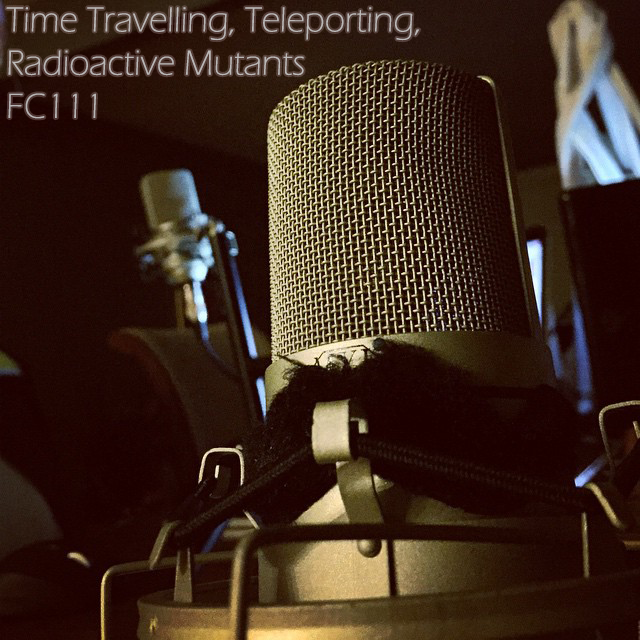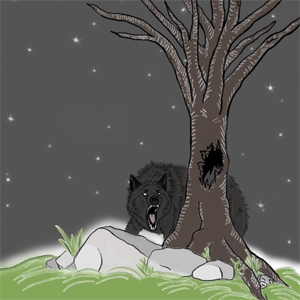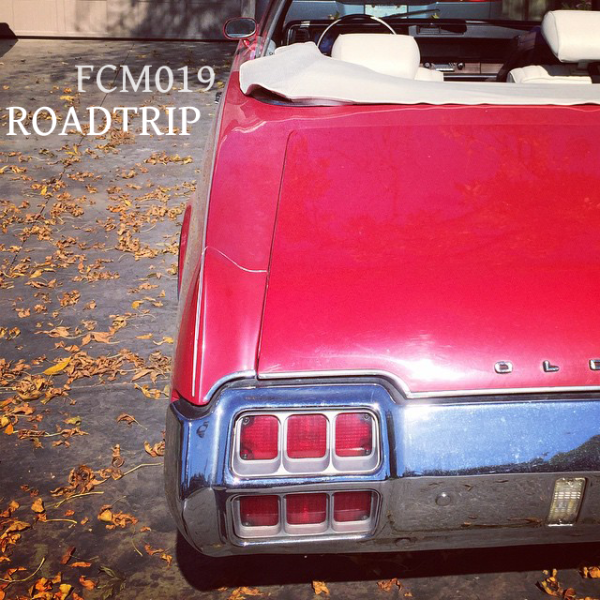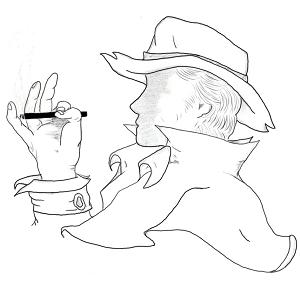FP404 – Mulligan Smith in The Cheat, Part 2 of 3
Welcome to Flash Pulp, episode four hundred and four.
Tonight we present Mulligan Smith in The Cheat, Part 2 of 3
(Part 1 – Part 2 – Part 3)
[audio:http://traffic.libsyn.com/skinner/FlashPulp404.mp3]Download MP3
This week’s episodes are brought to you by the works of Mike Luoma
Flash Pulp is an experiment in broadcasting fresh pulp stories in the modern age – three to ten minutes of fiction brought to you Monday, Wednesday and Friday evenings.
Tonight, Mulligan Smith, PI, finds himself involved in a high-speed chase.
Mulligan Smith in The Cheat, Part 2 of 3
Written by J.R.D. Skinner
Art and Narration by Opopanax
and Audio produced by Jessica May
“So, a month and a half later I’m working this gig. Another wandering penis, though this one with a different victim almost every night. Guy’s a friggin’ ghost though. Always meets his dates at their door, never gets out of his coupe, always brings them to the same place. A week’s work and he was giving me nothing – well, certainly nothing that was going to earn my client her alimony.
“It’d be a helluva check too, as Johnny Rocketcrotch replaces his BMW every six months and the only place he brings his dates is the sort of country club that’d make a clown in a hoodie like mine ten times before the valet could insist I was lost. To make matters even more fun, the car’s tinted like it was Dracula himself driving, so the Nikon was useless unless I could get up near the windshield.
”That’s the kind of shot you only get once, if you know what I mean.”
As the PI spoke, his companions watched Capital City’s east side slide by the baby blue Tercel’s windows. It was a warm day which left Walmart Mike, still toting his empty cup in his hand, to simmer in the dusty – but not altogether unpleasant – smell of the ancient sun-baked upholstery.
“I ain’t no private dick,” the greeter asked with a snicker, “but it seems to me that they don’t roll out beds at country clubs – well, hell, maybe they do, I ain’t ever been in one, but it seems like an awkward place to push rope, unless his gals were into crinkle-faced spectators?”
Smith Sr. snorted from the passenger seat, as, wheeling through a wide left turn, Mulligan picked up the thread of his story.
“Actually, you have a point there. See, this was one of those idiots who figures he has a technique. It was so cookie cutter I could easily make out its shape even from the distant shadows.
“He’d meet these ladies online – which I’ll get into later – then he’d roll them out to his little elite shanty to fill them full of wine. No doubt the grape juice came with impressive labels. They’d talk; he’d open up about himself, you know, try to make her feel like she was exactly what he’d been looking for.
“No mention of his wife, but that’s too big a hurdle for a one-date guy to jump – and, yeah, it was always just one date.
“They all concluded the same way: After dark, the BMW peeling out of the high fenced parking lot like the gate was a starting line. Then they’d take the long way towards downtown at twice the speed of light.
“I don’t know what too-practiced lines he used to talk them into it; I mean, I guess they thought it was a fun first date and he probably convinced them they were on the start of a road together. Whatever the case, about half of them would, uh, operate his gear shift while he pushed the straight-six to the edge. He’d drive with about the same recklessness if he was successful or not, but I could always tell how well he was faring by his hands. He’s one of those guys who argues in short, snide sentences, and if she said no he’d end up delivering these tiny pissed-off karate chops at the end of all of pinch-mouthed statements.
“There was no such verbal kung fu on the evening I caught up to him.”
Turning away from the scrolling cityscape, Smith Sr. delivered his son a raised brow.
“Yeah, yeah,” replied Mulligan, “I’m getting to it.
“So: Different lady almost every night, different car twice a year, but always the same way back to the heart of the city. It’s strange what patterns people’ll fall into.
“I waited till he was pulling off the waterfront, and his temporary sweetheart’s silhouette had disappeared from her upright position in the passenger seat, then I let myself be made. I mean, not badly enough that he brings things to a halt, but I pull up a half-block behind him and give him a kiss of the high beams so that I know he’s noticed.
 “Now, the Tercel is no match for his German missile. He punches it, and I’m left in the dust by the time he takes a right onto Independence Avenue. He slows just a bit crossing the rail line, and looks up from the blond bobbing mop in his lap – bam: There’s a baby blue shitbox on his rear bumper.
“Now, the Tercel is no match for his German missile. He punches it, and I’m left in the dust by the time he takes a right onto Independence Avenue. He slows just a bit crossing the rail line, and looks up from the blond bobbing mop in his lap – bam: There’s a baby blue shitbox on his rear bumper.
“Well, he really hammers it at that point and slides onto Bay at the last possible second, no doubt watching the Toyota blow by in his rear view.
“He makes a quick turn onto Delaware after that, probably thinking he’s clever but all the time following the same old route.
“Thing is, I’d cut over a dozen blocks back, and was already standing at the corner of Bronson. Just as he’s strutting by the bus stop I’m huddled in, a baby blue Tercel creeps onto the pavement, barricading both lanes at the next crossroad. Johnny stops to consider his options, and she lifts her head high enough to see what’s going on over the far side of the dash. The whole thing took four seconds, tops, but there was no mistaking what was going on in that photo.
“He was so flabbergasted at the sight of the camera that Dad had time to drive the second Tercel by to wave.
“I was trotting like Astaire till I got back to his wife’s place.
“Do you know how bloody long it took me to find that second car? Hey-zeus. I had him cold, but all I collected was a few hours of half-pay footwork and the deli sandwiches I expensed.
“The client delivers the rejection across a table that contains more hardwood than I’ve got flooring my entire apartment, and I’m reminding myself that suing the clients is bad for the reputation of my business. I was still feeling the sting from the previous month too, so, despite my attempts at good behaviour, I was working up to at least using some language the maid would have to clean up after – then the wife makes her peace offering.
“See, the reason she was stiffing me on the bill was because she’d gotten his Ashlin Wisconsin password – but she was afraid there would be strings attached or a fake out after she brought the material to court. She asks me to look into the source.”
Mike cleared his throat. “Ashlin, Wisconsin? Never been.”
Mulligan smiled. “Nah, it’s a website. Ashlin Wisconsin is a dating site for married folks.
“She asks if I’m interested, and, mind firmly on my rent bill, I say, ‘sure, but it’ll cost you five days fee up front.’ She cuts the check right there on the table.
“Hell, if I’d known what I was going to stumble into, I might’ve done the job for free.”
Flash Pulp is presented by http://skinner.fm, and is released under the Creative Commons Attribution-Noncommercial 3.0 Unported License.
Intro and outro work provided by Jay Langejans of The New Fiction Writers podcast.
Freesound.org credits:
Text and audio commentaries can be sent to comments@flashpulp.com – but be aware that it may appear in the FlashCast.
– and thanks to you, for reading. If you enjoyed the story, tell your friends.
 “She’d be damned if the grubby palmed bugger would hold onto the SUV through the divorce, however, which is why she hired me.”
“She’d be damned if the grubby palmed bugger would hold onto the SUV through the divorce, however, which is why she hired me.”
 “I wouldn’t talk,” replied the cop, “you have exactly two collared shirts, and one doesn’t really fit anymore. You only have the other because you won’t stop going to job interviews that will never hire a high-grade dumbass such as yourself.”
“I wouldn’t talk,” replied the cop, “you have exactly two collared shirts, and one doesn’t really fit anymore. You only have the other because you won’t stop going to job interviews that will never hire a high-grade dumbass such as yourself.”
 “The candy man’s face drops. He can’t look away, but his giddy glee has become total confusion.
“The candy man’s face drops. He can’t look away, but his giddy glee has become total confusion.
 At their center stood The Hag, an orb of light in one hand while the other rest on the torn and muck-covered jacket of her unchanged son’s shoulder. She was watching as each thrashing puppet climbed, in turn, atop the black-veiled platform their lifeless shoulders had carried across the face of Europe, over the salt, and through the dense wildwoods. There was smoke at each closing of the plush curtains, but no further evidence of its sacrifice’s passing.
At their center stood The Hag, an orb of light in one hand while the other rest on the torn and muck-covered jacket of her unchanged son’s shoulder. She was watching as each thrashing puppet climbed, in turn, atop the black-veiled platform their lifeless shoulders had carried across the face of Europe, over the salt, and through the dense wildwoods. There was smoke at each closing of the plush curtains, but no further evidence of its sacrifice’s passing. The old Roman roads were not so old when she began, and she slipped from the vineyards of the west to the steppes of the east just as a wind shifts and stirs at its own command.
The old Roman roads were not so old when she began, and she slipped from the vineyards of the west to the steppes of the east just as a wind shifts and stirs at its own command. Before long the thin-limbed lass whose wide brown eyes seemed to reflect an unflinching depth beyond a natural understanding was known simply as the Maiden.
Before long the thin-limbed lass whose wide brown eyes seemed to reflect an unflinching depth beyond a natural understanding was known simply as the Maiden.